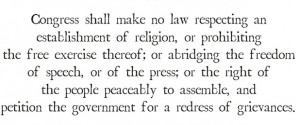Supreme Court unlikely to restrict political speech
 Opponents of free political speech are hoping a pending Supreme Court challenge to a Montana anti-speech law will result in the Court overturning its Citizens United decision, but one election expert isn’t so sure.
Opponents of free political speech are hoping a pending Supreme Court challenge to a Montana anti-speech law will result in the Court overturning its Citizens United decision, but one election expert isn’t so sure.
“The attempt to have the Supreme Court reconsider Citizens United stems from a conservative group’s challenge of a Montana law that bans corporate spending in Montana elections,” Jeff Brindle, executive director of the New Jersey Election Law Enforcement Commission, writes for Campaigns and Elections.
“In American Tradition Partnership, Inc., (ATP) and Western Tradition Partnership, Inc. v. Steve Bullock, Attorney General of Montana, the Petitioners seek to overturn the Montana Corrupt Practices Act, which dates to 1912.”
Anti-speech activists are hopeful Justice Steven Kennedy, usually a liberal vote, will side with them and strike down the ability of employers to engage in free speech. But Brindle points out Kennedy has usually sided with political speech, not government restrictions.
“Justice Kennedy has long been a foe of restrictions on campaign spending by corporations, having written the dissent in Austin v. Chamber of Commerce in 1990. That high court ruling refused to let the Michigan Chamber pay for a political ad directly from its corporate treasury and instead required the use of its PAC funds. Kennedy’s early dissent became law when he wrote the majority opinion in Citizens United, which discarded the precedent set in Austin.”
“As long as the composition of the Court remains the same, laws like Montana’s Corrupt Practices Act are likely to be found unconstitutional and inconsistent with Citizens United,” Brindle concludes.

